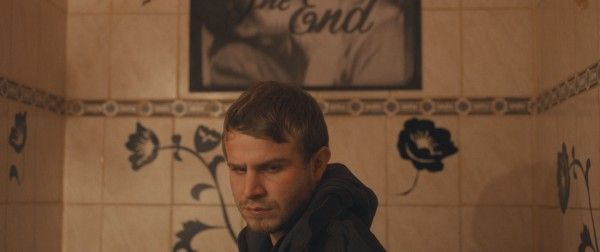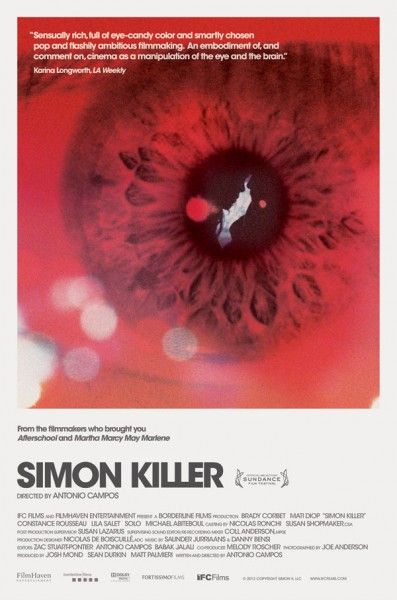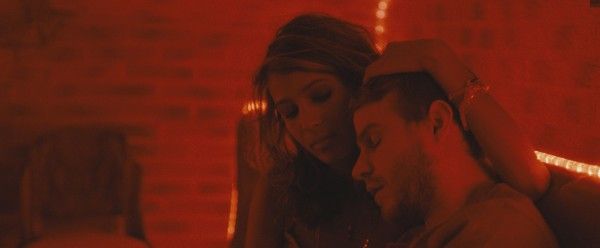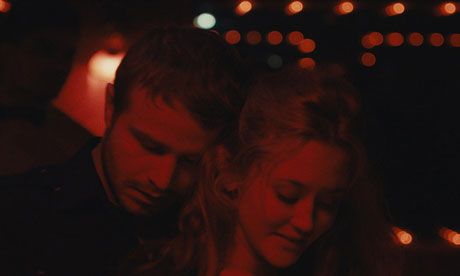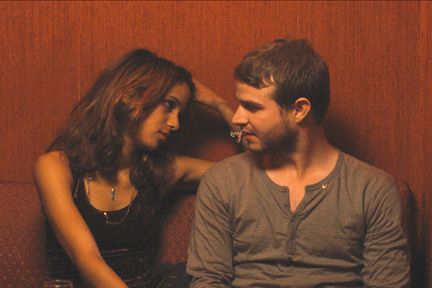From filmmaker Antonio Campos (Afterschool), the indie drama Simon Killer is an unsettling psychological portrait of a well-educated, handsome young man named Simon (Brady Corbet) who travels to Paris to get over a recent break-up. He soon finds himself drawn into a sex parlor where he has a sexual encounter with an exotic prostitute named Victoria (Mati Diop) that continues to spiral out of control.
During this recent exclusive interview with Collider, actor Brady Corbet and writer/director Antonio Campos talked about how this film came about, what they wanted to explore in the story they were telling, their collaboration on the portrayal of Simon, and the intention behind making the sex scenes so uncomfortable. Corbet also talked about treating his acting career as a master class, now that he’s trying his own hand at directing. Check out what they had to say after the jump, and be aware that there are some spoilers.
How did this film come about?
ANTONIO CAMPOS: I had the idea and I went to Brady, and Brady and I really flushed it out. The process was really developing this outline. And then, once we went to Paris, we began a process of casting, which was basically meeting actors that we liked. Brady knew some actors already, from a casting process that he was doing for a short film he was trying to make in Paris, a few years ago, so we went to some of those people. And then, Nicolas Ronchi, who was the casting director on the film with Susan Shopmaker, was instrumental in bringing us some good people. My theory about casting is that you either embrace a non-actor quality, or you take an actor like Brady, who’s recognizable and an experienced actor, and surround them with either less recognizable actors and/or non-actors. What I find happens is that there is something that each one of them is bringing out of the other that completes a picture, and you get lost more, as opposed to a cast that’s all recognizable faces that take you out of it, or at least takes me out of it. So, once each person came on, we started the process of improvising scenes. And then, once Mati Diop, who plays Victoria, came on, she really got involved with us, in terms of adding this whole other element to the story and to the character. She spent a great deal of time with the girls who actually work in those bars, and got to know them. The whole thing was an incredibly collaborative process, across the board.
Were there certain things you knew you wanted to explore with this film, going in?
CAMPOS: I knew I wanted to explore a break-up and I wanted to explore this gradual progression of a young man arriving at this killer that was inside him. A lot of it comes from the books I was reading at the time, which were Georges Simenon books, and the books by Jim Thompson were a big influence. Aside from the story, it was about exploring this darker side of a young man and his relationship with women, and putting a microscope on those things that I find in every man, that are either pronounced in some and not so much in others, and delving into that. Brady and I have very strong relationships with the women in our lives, and very healthy and loving relationships with the women in our lives, so we were interested in exploring this other side of ourselves and spending some time in the mire.
BRADY CORBET: Yeah, Simon seems to only cry for himself. We had a hunch that we were doing something strange. We were chasing after him, in the same way that we thought audiences would probably have to, as well. There are certain things about his behavior and the choices that he makes that are very, very clear to us, but there are certain decisions he makes that are opaque to virtually anyone who is of sound mind and body. I do think that, beyond certain circumstantial elements in the narrative, he’s somebody who is physiologically disposed to behave in the way that he does.
Was there a discussion or a collaboration about how to approach playing Simon, and this balance between the ambiguity and the sociopathic nature and the childlike quality that he has?
CORBET: The way that Antonio and I work together, in general, is very, very simpatico. We’re of a very like mind. There was a lot we didn’t have to discuss. I felt like we understood who he was, what he was, and what he’d end up. It was more about just trying to figure out the best way to organically present it, and that’s something that’s always a process between an actor and a director.
CAMPOS: The reason some people have a hard time with the film is because it’s very hard to categorize him and that was intentional. He’s not a clear sociopath. The reason why we have a clear idea of what a sociopath is in movies is because they’re presented so clearly, but they’re human. I think our portrayal of a sociopath is one that’s a little more nuanced than audiences are accustomed to, and a little more complicated because of the fact that you have these glimpses of humanity in him and that confuses you. Also, the way that we start off the film makes him incredibly relatable and sympathetic, in a way. By the end, you realize who this guy really is and you feel sort of dirty for ever feeling anything like that for him.
CORBET: The only negative responses I’ve seen, heard or talked about, in regard to the performance, is just a lack of charisma. People love villains, but they’re really quite ugly.
CAMPOS: Yeah, people love the charismatic sociopath, but that’s not really how it goes. That’s a movie sociopath that you construct in a way so that it’s easier to swallow, but it’s also very deceptive. The thing with this film is that, if you don’t like this guy, that’s fine. You don’t need to like him because he’s not doing anything that’s likeable. I find audiences’ desire to like someone very interesting. People do some awful things and you don’t have to let them off on it. The film doesn’t let him off. He gets away, but we don’t let him off, emotionally. I think that was an important thing for both of us. We weren’t going to let him off and we weren’t going to glorify him. I have this feeling that people tend to think that, if you make a movie about someone, in some way, you’re celebrating them because you’re giving them a spotlight, but it’s more so that we’re making a movie about someone because they seem strange and fascinating and you want to understand them. As filmmakers, you create a story and a character that you want to understand yourself. If people are feeling baffled or confused or ambivalent, that’s okay, but I sometimes feel that that’s because they don’t want to say, “I outright hated this guy,” because of the fact that you’re watching a movie about someone, and for a moment you felt like you liked him. There are a lot of things at play, in terms of the way people approach a movie, because of the fact that we’re conditioned to approach movies in a certain way.
There’s a lot of talk about the sex scenes in this being so explicit, but you don’t really see anything. It’s more that they’re just so uncomfortable and unsettling to watch that people are equating that with them being explicit. Was that an intentional approach?
CAMPOS: Yeah, it was intentional to present things as they were. The different between our sex scenes and other sex scenes is just angles. We’re giving you one angle, as opposed to various other angles, that gets you in there. But, this is what sex looks like. There was always that tension that you create when you decide not to jump in for the angles because you’re forcing your audience to sit and watch something, and you’re not giving them that relief of the movement of montage. That said, those scenes are filled with a lot of character, in my opinion. You see where that relationship is, between him and whoever the woman is, at each point in the story. I think it’s interesting that there’s this feeling that the sex scenes are really explicit when they’re really not that explicit, but that’s something I’ve had before. With Buy It Now, the short film that I directed years ago, about a girl who sells her virginity on eBay, that’s a film where you don’t see any nudity. You’re focused on her face, during the sex scene, over the guy’s shoulder, as she’s having sex with him, and it’s incredibly uncomfortable, but it’s what that sex scene would be. A young girl having sex with an older man who’s just bought her virginity is not going to be pleasant. For me, the story was in her face, and that’s where the camera rests for the majority of that scene, people all felt incredibly violated. When people talk about that film, they say, “Oh, there was all this explicit sex and nudity,” but there’s not one bit of nudity in that film and there’s only one sex scene. It resonates, and that’s the way I think a sex scene should be. If we were going for erotica, it would be a different thing and we would shoot it differently. I always find it interesting that people see a filmmakers work and think, “Oh, he doesn’t understand cinema. He does this because he doesn’t get it.” But no, we did this because that’s what we wanted to do. If your goal is to create something erotic, then you shoot it in a very specific way. If your goal is to create something pornographic, that’s something very specific. If your goal is to create something romantic, then that’s another set of shots. So, when your goal is to present something the way it looks and is, in the most direct fashion, then that’s a very direct way of shooting, and that’s the way that we took it.
Brady, now that you’re getting into directing, are you paying more attention to the filmmakers you work with, or is that something you’ve always done?
CORBET: Yeah, I’ve always done that. I’ve always been a lover of cinema, and I’ve tried to treat my acting career as a real master class for myself. I can’t say that it’s completely by design because a lot of things, of course, occurred by chance. But, if I saw even the slightest possibility of working with a real idol of mine, then I worked real hard at securing that. I pass on a lot. There’s not very many filmmakers that I like, and there’s not very many movies that I like, honestly, in a year anymore. I used to be able to put together a Top 10 list, at the end of the year, and the last couple of years, I could only put down five or six that I really loved. There are things that I like, but as far as the things that I think are going to matter in a few decades, there’s usually five or six in a year. There’s a lot of content, but I’m only interested in the ambitious content. At a certain point, I realized it was really important for me to take the reins of my career and march to the beat of my own drum. While that might be a financially difficult route to take, my pride and dignity would be very much left intact.
CAMPOS: It’s very easy, at some point, to go, “Oh, I’ll do this. I know this isn’t what I want to do, but it will be dine.” You do that and go, “With the next one, I’ll get back to what it’s all about.” And then, you do that again, and then, eventually, you get lost in that. I think you can have a very varied career and do different things and explore different kinds of cinema, but I think you have to do it very carefully and be very aware of what you’re doing because each choice has an affect on the next thing that you do.
CORBET: And each choice that you make affects people’s perception of the previous work, as well. You have to think about a body of work as a larger thing, and not just these isolated pieces.
Simon Killer is now playing in theaters.

